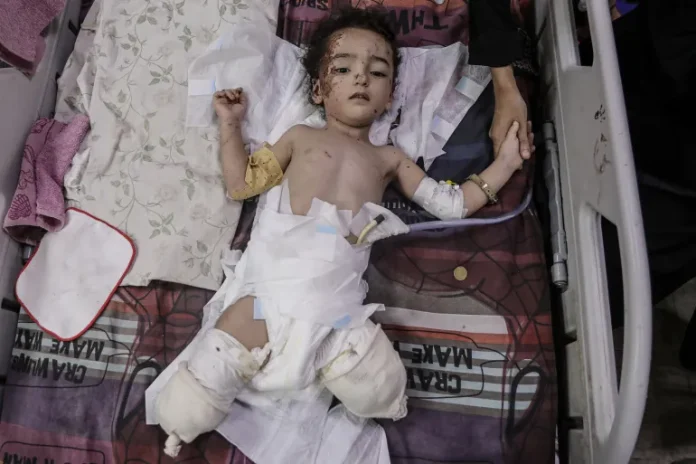Deir el-Balah, Gaza – Three-year-old Hanan al-Daqqi and her 22-month-old sister, Misk, are confined to a hospital, their lives forever altered by an Israeli airstrike. Once lively toddlers, they now face a future shaped by unimaginable loss: both girls had their legs amputated, and their mother, Shaima al-Daqqi, was killed in the same attack.
Hanan often asks her aunt, Shefa, difficult questions like, “Where’s Mama?” or “Where did my legs go?” But how does one explain such a tragedy to children so young? For the past four months, their family has been trapped in a harrowing nightmare.
A Routine Day Turns Tragic
On September 2, Shaima took her daughters to receive polio vaccines, part of a campaign allowed to proceed during Israel’s ongoing war on Gaza. The following day, after the family had lunch in their Deir el-Balah home, an Israeli bomb struck their house.
The airstrike killed 25-year-old Shaima and severely injured her husband, Mohammed, along with their daughters. Hanan lost both legs—one above the knee and one below—and suffered injuries to her face, intestines, and other parts of her body, requiring multiple surgeries. Misk’s left foot had to be amputated, while Mohammed spent weeks in intensive care battling a brain hemorrhage and other injuries.
A Struggle for Healing
Hanan and Misk have been kept in the hospital for ongoing monitoring due to their rapid growth and need for constant follow-ups on their lengthening bones. However, Gaza’s healthcare system, devastated by the war, offers limited resources for physical therapy and no psychological support.
Shefa, their aunt, has become their primary caregiver, supported by other family members. Despite their efforts to comfort the girls, the absence of their mother looms large. Hanan, who once loved dressing up in pretty clothes and shoes, now stares at her cousin’s legs in confusion, unable to understand why her own are gone.
A Mother’s Love and Unanswered Questions

Shaima was a devoted mother who lived for her daughters’ happiness. During the war, she was consumed with fear for their safety. Her love drove her to ensure they received the polio vaccine, only for their lives to be shattered a day later by a bomb.
“She adored them,” says Shefa, recalling Shaima’s dedication. “It’s heartbreaking to think that while she was protecting them from one threat, another one took everything away.”
A Long Road Ahead
Hanan and Misk’s recovery depends on medical treatment unavailable in Gaza. Their names are on a list of patients awaiting Israeli approval to leave for treatment abroad, but after three months, their case remains stagnant. They require prosthetic limbs, surgeries, and rehabilitation to regain a semblance of normalcy.
“They are just little girls who need help,” Shefa pleads. “Their mental and physical state is worsening every day. How can we explain to them that their lives will never be the same?”
The road to healing is long, but as Gaza’s war continues to leave families shattered, stories like Hanan and Misk’s underline the human cost of conflict.



